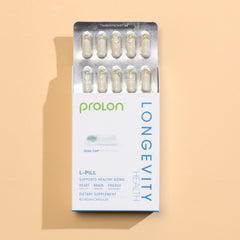
The New Champion of Health Programs: How the Fasting Mimicking Diet Surpasses the Mediterranean Diet
For years, the Mediterranean Diet (MD) has been celebrated as the gold standard in nutritional health, often hailed as the best diet for heart health and longevity. However, a groundbreaking study published in Nature, a world-renowned research publication, has just reshaped the dietary landscape. This pivotal research introduces a new contender that matches (and in some cases, trumps) the long-reigning MD: the Fasting Mimicking Diet (FMD) AKA Prolon! As the only Fasting Mimicking Diet, Prolon’s 5-Day Reset now reigns supreme.
FMD is not just another diet trend; it is ingeniously designed to mimic the effects of fasting and has proven its mettle against the Mediterranean Diet. This innovative approach is rooted in decades of research and is designed to play on the body's natural ability to regenerate and rejuvenate, offering a fresh perspective on what it means to eat for health.
The Groundbreaking Study: A Comparative Analysis
The study focused on overweight and hypertensive patients, embarking on a journey with either the continuous Mediterranean Diet or cycles of the Fasting Mimicking Diet over four months. The aim? To unfold the impacts of these diets on vital health markers, especially focusing on the intricate dance of endothelial function, a key player in cardiovascular health.
In the compelling study from Nature, FMD shows its remarkable efficiency: just four 5-day cycles over four months brought about impressive health benefits that were on par with, or even surpassed, those from 120 continuous days on the Mediterranean Diet. This comparison is eye-opening — it shows that short, focused bursts of the FMD can be just as effective, if not more so, than daily, long-term diet changes. It's a game-changer for those looking for impactful health improvements without the commitment to a constant diet regimen. But that’s not all…
Key Findings: FMD's Superior Edge
As the results rolled in, FMD didn't just perform; it excelled, revealing several distinct advantages. While both diets positively impacted weight loss and cardiometabolic risk factors, FMD showed superiority in several key areas:
- Muscle Protection: After the 4-month period, those following the Mediterranean Diet lost more muscle mass compared to those following the FMD. In fact, the fasting group showed no change in muscle mass; whereas the Med Diet saw nearly 2 lbs of muscle loss and nearly 5 lbs of fat-free muscle loss (which includes bone mass), indicating the potential contribution to increased frailty, falls, and fractures in old age.
- Metabolic Markers: After the 3-month follow-up period, participants on the FMD showed more sustained long-term effects with decreased Insulin, HbA1c, and HOMA-IR levels. These changes were not seen in those following the MD.
- Reactive Hyperemia Index (RHI): FMD participants exhibited a significant reduction in RHI, suggesting a potential rejuvenation effect associated with a decrease in biological age. This change was notably absent in the MD group. RHI is a critical measure of blood flow and vascular response, often associated with cardiovascular health, and low RHI scores are typically seen in younger adults.
- Body Composition: Both diets resulted in reductions in body weight, BMI, and waist circumference. However, FMD uniquely showed significant changes in trunk fat mass, an indicator of visceral fat, which is closely linked to metabolic diseases.
- Commitment: This study compared strict adherence to the Mediterranean Diet for 120 days, compared to only 20 days of Prolon (split into four cycles of 5-days). This makes following FMD a more sustainable and achievable option for a larger subsect of people than does a full overhaul of diet and lifestyle in order to properly follow the Med Diet.
Breaking Down the Science: Understanding the Impact
The study's findings are rooted in the unique way FMD affects the body. By mimicking fasting, this diet triggers a state of ketosis, a metabolic state where the body burns fat for fuel. It also activates an internal cleanup and repair system called autophagy, a process only observed in those following a prolonged water fast. Both states are associated with numerous health benefits, including improved insulin sensitivity and reduced inflammation. Equally as important, because the FMD provides some nutrition, the body is able to bypass muscle breakdown, thereby preserving lean body tissue and overall metabolic function post-fast.
A New Era in Dietary Health
This study marks a significant milestone in nutritional science, challenging long-held perceptions about the best diets for health. The Fasting Mimicking Diet emerges not just as an alternative to the Mediterranean Diet but as a complimentary choice for those seeking comprehensive health benefits. Its ability to induce profound metabolic and cellular changes positions it as a powerful tool in the quest for optimal health and longevity. As we continue to explore the intricacies of diet and health, FMD stands as a testament to the ever-evolving nature of nutritional science, offering a promising path for those seeking to enhance their health through informed dietary choices.













